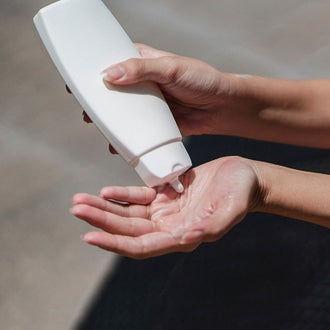There is plenty of misinformation online and on social media about the safety of sunscreens. We’re here to sort out the fact from the fiction and discuss the chemicals found in sunscreens.
Alexandra from Sydney asked:
Are chemical sunscreens safe to use? I've read they are toxic so I'm considering switching to organic sunscreen."
Chemicals found in sunscreens sold in Australia are safe to use without the risk of cancer.
Australia has the highest rate of skin cancer in the world. To minimise the risk of developing skin cancer, you should use a SPF50 or SPF50+ broad spectrum sunscreen, along with the four other forms of sun protection (protective clothing, a hat, sunglasses and seeking shade) when UV levels are forecast to reach 3 or above. In Australia, many people need to rely on sunscreen every day to protect exposed areas of skin, so it is vital that all sunscreens are safe, effective and good quality.
In Australia, the Therapeutic Goods Administration (TGA) regulates sunscreen ingredients, ensuring that only approved ingredients, including chemicals - which have been assessed for quality, safety and efficacy - are used in each product. There have been rigorous scientific reviews on the safety of ingredients used in sunscreen, and there is strong evidence that the active ingredients in TGA-approved sunscreen are safe to use.
There is active international consideration of the chemicals permitted in sunscreens, and Cancer Council continues to monitor the evidence. Meanwhile all sunscreens manufactured for sale in Australia need to comply with TGA requirements.
There is some confusion about the safety of sunscreen among the community. Cancer Council carried out a survey of 1000 Australians from ages 18 to over 76 years and found that nearly half of respondents believed that sunscreen contained chemicals that were bad for you. Some manufacturers even advertise that their sunscreen products do not contain cancer-causing (carcinogens) chemicals found in other sunscreens.
Chemicals found in TGA-approved sunscreens sold in Australia are safe to use without increasing your risk of cancer.
Some sunscreens may market themselves as organic or natural – these products often use physical blockers, such as zinc, to help protect against UV. Cancer Council recommends using an SPF50 or SPF50+ sunscreen that is broad spectrum, water resistant and TGA approved. Interpreting this information can be tricky so rest assured that all primary sunscreens sold in Australia are TGA approved . We also recommend that you store your sunscreen below 30° C and check the expiry date, as products that are exposed to higher temperatures or are past their expiry date, while not harmful, will not give you proper protection against UV radiation.
As long as your sunscreen meets these requirements, the brand or ingredients you choose is up to you — it is important you find one you like as you will be more likely to use it and reapply. To check if something is TGA approved, look for the reference that says the product complies with AS/NZS 2604:2012.
Be wary of using products that aren’t TGA approved, or are purchased overseas. These may not have been properly tested for effectiveness, not actually be a sunscreen, or be homemade and may not comply with requirements for use within Australia or provide an appropriate level of sun protection.
Sunscreen should not be used as the only line of defence against the sun, be sure to protect yourself in all five ways to minimise the risk of skin cancer – slip on sun protective clothing, slop on SPF50 or SPF50+ sunscreen, slap on a broad brim hat, seek shade and slide on sunglasses when the UV is forecast to reach 3 or above.
iHeard hub
Thank you for joining the mission against misinformation
If you’ve heard a rumour about cancer, or are unsure about information you’ve read online, ask your own cancer question via the iHeard hub.
We want everyone to have the correct information about cancer so if you know anyone else with a cancer question, why not let them know about iHeard?
Author: Claire Wharton, Writer, Cancer Council Australia
Article reviewed by: Dr Amelia Smit, Research Fellow (Melanoma and Skin Cancer), The Daffodil Centre, The University of Sydney

